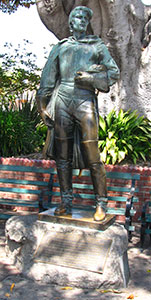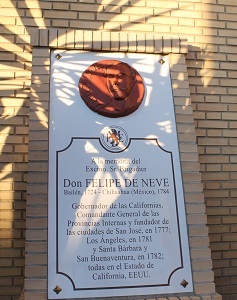Soldier. Brigadier. Governor of California. Commanding General of the Inner Provinces.
He was born in Bailén in the year 1724, although some authors mark his birth-year as 1727. The exact date is unknown, due to the archives of the Parish Church of the Incarnation being destroyed during our last Civil War.
He was son to Felipe de Neve Noguera Castro y Figueroa and Ms. María Padilla y Castilla, both of noble birth and residents of Seville.
Thus, being his father Cavalry Arms Captain and Mayor of the Town, by the Count Mr. Don Joaquín I Ponce de León Lancáster y Cárdenas, VII Duke of Arcos and IX Count of Bailén; Mr. Felipe de Neve would start his military career in 1744, enrolling as a cadet in the Infantry Regiment of Cantabria, garrisoned in Seville. In August, 1746, he is transferred to the Guard of Corps Company. Furthermore, in the year 1749, he is once again transferred to the Cavalry of Flandes Regiment with a Lieutenant rank, and, later, to the Cavalry of Milán and del Rey Regiments, as well as working his way up to the job of Assistant (Captain) in 1756.
In 1767, Mr. Felipe de Neve was destined to carry out the Jesuit’s expulsion order from the territories under Spanish sovereignty, by order of the Spanish Crown (Carlos III). Thus, he is promoted to Lieutenant Colonel rank in 1774, appointed by viceroy Bucarrelly, Intern Governor of Las Californias, territory that would become part of the Spanish advance in the coasts of the Northern Pacific, the 28th of October of the same year.
Subsequently, having settled there, he founded several settlements. The first being the village of San José de Guadalupe in 1777, which became the first Spanish colony in the New California and a town used as an agricultural center, with the goal of aiding the prisons in San Francisco and Monterrey. It was followed by the village of Nuestra Señora de Los Ángeles del Río y Porciúncula, in September 1781, the village of Santa Bárbara in March 1782, and the village of San Buenaventura, also in March 1782.
His career peaked with his promotion to Brigadier, by royal decree the 15th of February of 1783, the bestowing of the Order of Charles III and the naming, in August of that same year, as Commanding General of the Inner Provinces.
Lastly, shortly after the completion of a campaign in Sonora, Don Felipe de Neve fell ill, and, feeling himself close to death, in August 1784 on his way to Chihuahua, he made his will, passing away a few days later. He was the only Commander that died in the military command, and his passing was one of the elements of the crisis that immediately afflicted the inner provinces and Spain’s expansion projects in the American West.

